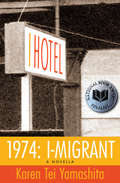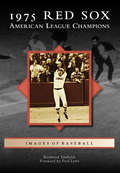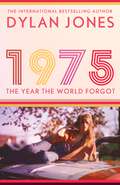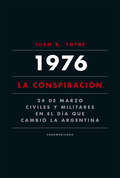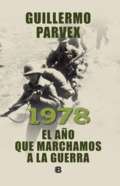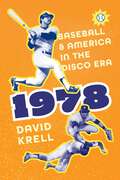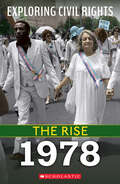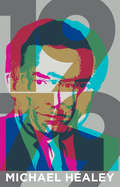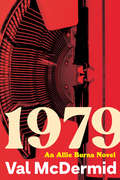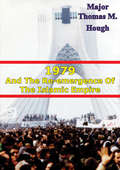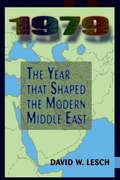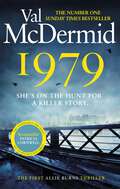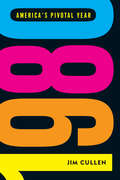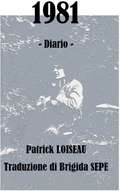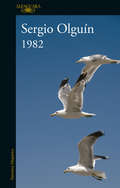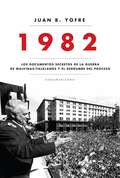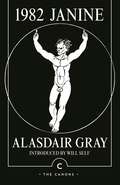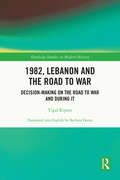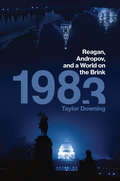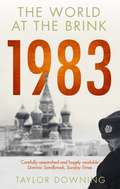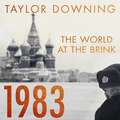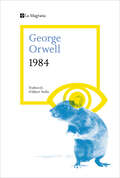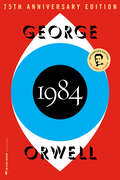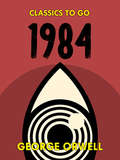- Table View
- List View
1974: I-Migrant Hotel (I Hotel #7)
by Karen Tei Yamashita"I-Migrant" is the seventh novella of I Hotel, a National Book Award finalist and epic of America's struggle for civil rights as it played out in San Francisco's Chinatown. Yamashita's cast of students, laborers, artists, revolutionaries, and provocateurs make their way through the history of the day, caught in riptides of politics and passion, clashing ideologies and personal turmoil.
1975 Red Sox: American League Champions (Images of Baseball)
by Raymond Sinibaldi Fred LynnThe 1975 American League Champion Boston Red Sox squared off with the Cincinnati Reds in what is widely recognized as one of the best World Series ever played. The Major League Baseball Network has named its sixth game "the greatest game ever played." The Red Sox were led by two rookies, 21-year-old Jim Rice and 22-year-old Fred Lynn, who formed a rookie duo the likes of which baseball had never seen. They combined with a budding superstar in Carlton Fisk and his aging counterpart Carl Yastrzemski to lead the Red Sox attack, while a wily Luis Tiant anchored the pitching staff. After a first-round sweep of the three-time World Champion Oakland A's, they advanced to a Fall Classic that echoes through the ages, and in the words of Carlton Fisk, the Red Sox won "three games to four.
1975: The Year the World Forgot
by Dylan JonesThere is a myth that the long, dark days before punk were full of legions of British prog rock groups; that the likes of Yes, Genesis, King Crimson, Emerson Lake & Palmer and Jethro Tull roamed the land, soiling the culture like university-educated Orcs.Wrong.The mid-seventies were dense with extraordinarily sophisticated, mature rock music made by singers, songwriters and musicians who had no problem calling themselves artists. And the records they made aspired to artistic status: everyone was trying to make their own masterpiece, and the sense of competitiveness was like something not seen since the mid-sixties. Three-minute pop singles had given way to concept albums and pop-package tours had been supplanted by rock festivals, and rock in general had a renewed sense of ambition.1975 was the apotheosis of the adult pop, the most important year in the narrative arc of post-war music, and a year that was rich with masterpieces: Blood on the Tracks by Bob Dylan, The Who by Numbers by the Who, Young Americans by David Bowie, Another Green World by Brian Eno, The Hissing of Summer Lawns by Joni Mitchell and A Night at the Opera by Queen, amongst countless other legendary albums.These records were magisterial; records that couldn't be bettered. Who could realistically make a more sophisticated album than The Hissing of Summer Lawns? Or a more complex hard-rock album than Physical Graffiti? Or indeed a record as unimpeachable and as prescient as Horses?1975, as Dylan Jones expertly illustrates, was the greatest year of them all.
1976. La conspiración: 24 de marzo. Civiles y militares en el día que cambió la Argentina
by Juan B. YofreEste libro es la continuación obligada del best-seller Nadie fue, que reconstruía en detalle los últimos meses, días y horas de Isabel Perón en el poder. Aquí también se presentan documentos desconocidos y testimonios obtenidos especialmente por el autor, pero no es una versión actualizada de Nadie Fue; es más bien su contracara: qué pasó más allá de Isabel en los dos años previos a su derrocamiento.En las páginas del libro están presentes Isabel Perón y López Rega, Mario Firmenich y Roberto Santucho, Emilio Massera y Jorge Videla, en situaciones y diálogos hasta ahora no revelados, pero también decenas de personajes chicos, grises, muchas veces desconocidos, otras veces de apariencia irrelevante, que forman un rompecabezas de secretos, intrigas, operaciones militares, políticas y de inteligencia que provocaron el golpe. A ello suma una descripción del contexto social -las tapas de los diarios, las entrevistas de los periodistas estrella de aquellos años, los personajes sociales del año- que completa el cuadro de época.Durante la última década de investigaciones el autor obtuvo testimonios directos y diarios íntimos de algunos de los principales actores de esos años, muchos de ellos protagonistas de la trama que derivó en el derrocamiento de Isabel. Yofre también accedió a archivos hasta ahora infranqueables de la inteligencia de Moscú, La Habana, Praga, Budapest y Washington de aquellos años. A eso suma sus propios relatos, correspondencia personal y diálogos con algunos personajes que cuentan de primera mano cómo fue el camino al 24 de marzo de 1976.
1978. El año que marchamos a la guerra
by Guillermo ParvexEl mismo autor del exitoso Un veterano de tres guerras entrega este relato que cobra actualidad a 40 años de una guerra que no fue Mientras estudiaba Periodismo en la Universidad de Chile, Guillermo Parvex fue llamado por el Ejército para recibir instrucción militar específica y ser parte de las milicias chilenas que se dirigirían a la frontera con Argentina. Era 1978, Parvex tenía 24 años y la guerra con el país vecino era inminente. Este libro reconstruye la historia personal del autor durante los meses que estuvo en la frontera y el contexto histórico de esos difíciles años, un relato inédito en primera persona que nos habla de aquellos años convulsos en que se ocultaba la movilización de tropas hasta las regiones limítrofes que nos separan del país vecino. Reseña: "Un libro que reconstruye por primera vez la instrucción militar que recibieron en secreto miles de jóvenes chilenos."
1978: Baseball and America in the Disco Era
by David KrellAmericans struggled to find their footing in the late 1970s. The Vietnam War ended with more than fifty-eight thousand American soldiers&’ deaths; the public&’s trust in politicians plummeted amid the Watergate scandal. As deadly blizzards ripped through the Midwest and Northeast in early 1978 and caused hundreds of millions of dollars in damages, Americans turned to baseball for the welcome distraction and promise of a new season. From spring training to the World Series, 1978 gave baseball fans one of the sport&’s greatest seasons, full of legendary moments like the battle between the New York Yankees and the Boston Red Sox for the American League East pennant, Gaylord Perry&’s three thousandth strikeout, Tom Seaver&’s only career no-hitter, Willie McCovey&’s five hundredth home run, and Pete Rose&’s marathon forty-four-game hitting streak. The 1978 season played out against a backdrop of disco music, bell-bottom pants, and gas-guzzling cars, while Hollywood answered a desperate longing for a simpler time with nostalgic offerings such as Grease, The Buddy Holly Story, American Hot Wax, Animal House, and Superman. Robin Williams became a household name with a guest appearance on the popular TV show Happy Days, Atlantic City debuted its first casino, and Jill Clayburgh symbolized the emerging independence of women in An Unmarried Woman. In a memorable end to the baseball season, Reggie Jackson and Bucky Dent led the Yankees to their second consecutive World Series over the Dodgers after losing the first two games, then winning four in a row. With a month-by-month approach, David Krell breaks down major events in both baseball and American culture at large in 1978, chronicling in novelistic detail the notable achievements of some of the greatest players of the era, along with some of the national pastime&’s quirkiest moments, to capture an extraordinary year in baseball.
1978: Exploring Civil Rights (Exploring Civil Rights)
by Nel YomtovLearn about the key events of the civil rights movement in the latest installment of this exciting and informative series.The year 1978 was one of steps toward equality in the civil rights movement. In February, Max Robinson successfully became the first African American broadcast network anchor for ABC news. In June, the Supreme Court case California v. Bakke ruled that affirmative action was legal in the United States and race could be included in the criteria for admissions into colleges and universities. In July, the National Organization of Women coordinated an impressive march of 100,000 demonstrators in Washington, DC, in support of the Equal Rights Amendment. And the world watched as African American boxer, Muhammad Ali, defeated Leon Spinks to win his third heavyweight title in September, becoming the first person to ever to win the title three times.This detailed account explains why 1978 was such a critical year in the civil rights movement.ABOUT THE SERIES:The years from 1967 to 1978 were critical to the civil rights movement. Resistance was often met with violence against Black Americans struggling to end discrimination and segregation. Yet the courage of those yearning for equal opportunities under the law continued to persevere and set the stage for even more progress in the coming decades. Discover how this specific time period brought about change and how it still affects us as a society today.With stunning photographs throughout and rich back matter, each book focuses on a specific year and chronologically follows the detailed events that occurred and the changes that took place.
1979
by Michael HealeyIt’s December 1979 and Clark’s minority Progressive Conservative government is under threat of dissolution before it has a chance to accomplish anything — even pass a budget. But Clark is young and idealistic, resolute on making his mark in office. When he steals a moment at his desk to make a crucial decision, his colleagues, including Brian Mulroney and Pierre Trudeau, take the opportunity to steer him in different directions.
1979 (The Allie Burns Novels Series #1)
by Val McDermid<p>A Scottish journalist is drawn into a world of corruption, terror, and murder in the new novel by “one of crime fiction’s most eminent writers” (Entertainment Weekly).<p> <p>The year started badly and only got worse—blizzards, strikes, power cuts, and political unrest were the norm. For investigative journalist Allie Burns, however, someone else’s bad news was the unmistakable sound of opportunity knocking, and 1979 is ripe with possibilities.<p> <p>But Allie is a woman in what is still a man’s world. Desperate to get away from the “women's stories” the Glasgow desk keeps assigning her, she strikes up an alliance with wannabe investigative journalist Danny Sullivan. From the start, their stories create enemies. First an international tax fraud, then a potential Scottish terrorist group aiming to cause mayhem ahead of an impending referendum. And then Danny is found murdered in his flat. For Allie, investigative journalism just got personal.<p> <p>The debut of an intense new series, 1979 is an atmospheric journey into the past with intriguing insight into the present, from a Diamond Dagger winner and multiple Edgar Award finalist.<p>
1979 And The Re-Emergence Of The Islamic Empire
by Major Thomas M. HoughIn 1979 the age old struggle for the control of Islam between the Shiite and Sunni sects re-emerged in the Middle East. Four events occurred in 1979 that defined the context of contemporary Middle Eastern politics: the Islamic revolution in Iran, the signing of the Egyptian-Israeli peace accords, the siege of the Grand Mosque in Mecca, Saudi Arabia, and the Soviet invasion of Afghanistan. This monograph directly addresses the roots of current Middle Eastern actors such as HAMAS, FATA, Hezbollah, Al-Qaida, and the Taliban in the aftermath of these four critical events that occurred in 1979.The methodology for this monograph consists of analyzing each of these four events and then synthesizing this information in order to determine how 1979 shaped the modern Middle East. Since the seventeenth century the Sunni sect dominated Islam. The Iranian revolution reenergized the Shiite sect throughout the Middle East while Sunni power simultaneously eroded throughout the region. While the Shiites were inspiring the Islamic community in 1979, the Sunni suffered significant blows to their legitimacy as the leaders of Islam.This monograph asserts that the prevailing conflict within the Middle East is first and foremost a contest between the Shiites and the Sunni for preeminence within the Islamic world. The conflict between Islam and the outside world remains secondary in importance. The contemporary Middle Eastern actors that dominate the western consciousness such as HAMMAS, FATA, Hezbollah, Al-Qaida, and the Taliban constitute proxy armies created by the Shiite and Sunni leadership to wage a war for influence within the Islamic world. The events of 1979 have resulted in a leveling of power in the Middle East and the emergence of the Shiites as an ideological peer competitor to the traditionally dominant Sunni.
1979: The Year That Shaped The Modern Middle East
by David W. LeschThe Israeli-Palestinian peace process, the continuing US-Iraqi confrontation, the changing political dynamics in Iran, recent Pakistani-Indian hostilities and Osama bin Laden-all of these have one important common denominator: Significant strands of their origins can be traced to the tumultuous year of 1979. This text offers a new paradigm for stud
1979: The unmissable first thriller in an electrifying, brand-new series from the Queen of Crime (Allie Burns)
by Val McDermidTHE FIRST IN A THRILLING NEW SERIES FROM THE QUEEN OF CRIMEThe shadows hide a deadly story . . .1979. It is the winter of discontent, and reporter Allie Burns is chasing her first big scoop. There are few women in the newsroom and she needs something explosive for the boys' club to take her seriously.Soon Allie and fellow journalist Danny Sullivan are exposing the criminal underbelly of respectable Scotland. They risk making powerful enemies - and Allie won't stop there.When she discovers a home-grown terrorist threat, Allie comes up with a plan to infiltrate the group and make her name. But she's a woman in a man's world . . . and putting a foot wrong could be fatal.__________'A brilliant novel by a supremo of the genre at the height of her powers. A cast of engaging new characters promise to make this an unmissable new series' PETER JAMES'Remarkable and compelling . . . the Queen of Crime has delivered another masterpiece' DAVID BALDACCI'Val McDermid is the absolute QUEEN. Allie is a fabulous character, I'll go wherever she takes me and I'm dying to see what she does next' MARIAN KEYES'Packed full of Val McDermid's trademark brilliance, 1979 is a thrilling snapshot of a fascinating era' JANE HARPER'Unrivalled. Unmissable. Unforgettable. 1979 is Val McDermid at her nail-biting, heart-rending best' CHRIS WHITAKER'McDermid was a newshound at the time and it shows . . . Her best book in years' THE TIMES, BOOK OF THE MONTH'Allie Burns is off to a flying start, and well worth following down the decades' THE SCOTSMAN'A brilliant thriller, as well as a perfect snapshot of the social and political issues of the time' LINWOOD BARCLAY'A new series from Val McDermid promises to be an event - and 1979 delivers. Full of wit, thrills and incisive social observation and features a marvellous new character to follow through the years to come' MICK HERRON'Absolutely fantastic. I have been reading Val McDermid for twenty-five years, so I am really saying something when I tell you I enjoyed this novel the most' CHRIS BROOKMYRE'Brilliant characters, masterful plotting and a pitch-perfect evocation of the heyday of newspapers. I loved it' CHRIS HAMMER'A gratifyingly multi-faceted character' FINANCIAL TIMES'The work of a writer at the peak of her powers' HERALD'The fast-paced storytelling flows irresistibly' IRISH TIMES
1980: America's Pivotal Year
by Jim Cullen1980 was a turning point in American history. When the year began, it was still very much the 1970s, with Jimmy Carter in the White House, a sluggish economy marked by high inflation, and the disco still riding the airwaves. When it ended, Ronald Reagan won the presidency in a landslide, inaugurating a rightward turn in American politics and culture. We still feel the effects of this tectonic shift today, as even subsequent Democratic administrations have offered neoliberal economic and social policies that owe more to Reagan than to FDR or LBJ. To understand what the American public was thinking during this pivotal year, we need to examine what they were reading, listening to, and watching. 1980: America's Pivotal Year puts the news events of the era—everything from the Iran hostage crisis to the rise of televangelism—into conversation with the year’s popular culture. Separate chapters focus on the movies, television shows, songs, and books that Americans were talking about that year, including both the biggest hits and some notable flops that failed to capture the shifting zeitgeist. As he looks at the events that had Americans glued to their screens, from the Miracle on Ice to the mystery of Who Shot J.R., cultural historian Jim Cullen garners surprising insights about how Americans’ attitudes were changing as they entered the 1980s. Praise for Jim Cullen's previous Rutgers University Press books: "Informed and perceptive" —Norman Lear on Those Were the Days: Why All in the Family Still Matters "Jim Cullen is one of the most acute cultural historians writing today." —Louis P. Masur, author of The Sum of Our Dreams on Martin Scorsese and the American Dream "This is a terrific book, fun and learned and provocative....Cullen provides an entertaining and thoughtful account of the ways that we remember and how this is influenced and directed by what we watch." —Jerome de Groot, author of Consuming History on From Memory to History
1981 - Diario
by Patrick LoiseauIl 1981 fu un anno importante. Importante per me, perché ancora una volta mi liberavo dalle catene dimettendomi dal mio impiego e scrivendo, per mia figlia, che sarebbe nata di lì a poco, o perlomeno così speravo. Anche la Francia tentava di liberarsi dalle sue catene, o almeno la Francia popolare, quella che lavoro e si alza presto. In entrambi i casi, per me e i lavoratori, la posta in gioco era una scommessa sul futuro, la cui parola libertà non era il minimo dei concetti. Scommessa rischiosa. Per quanto mi riguarda, la scommessa era vinta in anticipo; da un lato perché sapevo che questo bambino sarebbe nato anche solo per onorare il papà-gallina rivoluzionario in moto che ero, d'altra parte perché all'inizio non avevo molta illusione su cosa sarebbe stato un governo di collaborazioni di classe..
1982
by Sergio OlguínLa historia de amor prohibido entre un joven de 19 años y su madrastra en el contexto de la guerra de Malvinas. <P><P> «¿Cuántas posibilidades hay en la vida de cruzarse con esa persona? <P> Ellos habían tenido la suerte de encontrarse. Las circunstancias eran un detalle menor, una línea en la historia de su amor.» Pedro tiene diecinueve años y, a diferencia de los hombres de su familia, no eligió la carrera militar sino la Facultad de Filosofía y Letras. <P>Pero corre el año 1982, y su refugio en la lectura o en las canciones de Spinetta es sacudido por el desembarco de las tropas argentinas en Malvinas: su padre, el teniente coronel Augusto Vidal, se encuentra en el frente de batalla. Aunque Buenos Aires esté lejos, la guerra lo enrarece todo. <P>El compás de espera que viven en su casa lo aproxima a Fátima, su madrastra. <P>Entre ellos surgirá un deseo desconocido e irrefrenable, un amor con la fuerza arrasadora de la libertad. Una pasión cargada de erotismo que tendrá consecuencias devastadoras. <P>Sergio Olguín ha escrito una novela que deja al desnudo los alcances insospechados del horror en tiempos de muerte y opresión. Una obra conmovedora que reúne los mejores atributos de su literatura: la gracia, la belleza, la oscuridad.
1982 (EBOOK)
by Juan B. YofreEl presidente militar argentino jamás imaginó que 1982 iba a convertirse, por la vía de la aventura de Malvinas, en el año que cambiaría para siempre la historia de las últimas décadas. Galtieri -lo mismo que el resto de la Junta Militar- pensaba que los ingleses jamás iban a mandar su flota, que los norteamericanos se alinearían con Buenos Aires, que las islas volverían a tener por siempre la bandera celeste y blanca y, básicamente, que la guerra de Malvinas le iba a garantizar a los militares gobernar el país hasta 1989. Se equivocó en todo. A través del análisis de un gran número de documentos reservados del Proceso (la totalidad de los papeles de la Cancillería y la "Memoria" realizada por la Junta Militar), 1982, el nuevo libro de Juan Bautista Yofre, revela la guerra y sus laberintos políticos y diplomáticos como jamás se habían mostrado. Su relato se basa en una tarea de investigación notable, para la que el autor no contó con ayuda oficial de ninguna índole. Yofre vuelve a trabajar sobre información "dura" para llegar a una serie de conclusiones que, a treinta años del conflicto, están llamadas a cambiar la perspectiva que hasta hoy se tenía acerca de Malvinas, sus causas y sus consecuencias. "Conozco a la Señora Thatcher y sé que es muy decidida, contestará todo acto de fuerza con más fuerza. (...) Le pediría a mi vicepresidente que viaje y trate de arreglar esta situación, pero por favor eviten el conflicto." Ronald Reagan "Le agradezco pero es tarde, los hechos están lanzados." Leopoldo Fortunato Galtieri
1982, Janine (Canons)
by Alasdair GrayA postmodern novel of melancholy memory and erotic fantasy—&“a filthy tour de force&”—by the acclaimed Scottish author of Poor Things (The Washington Post). 1982, Janine is a searing portrait of male need and inadequacy, as explored via the lonely sexual fantasies of Jock McLeish, failed husband, lover, and businessman. Alone in a hotel room, Jock attempts again and again to escape the realities of his life through an elaborate sadomasochistic fantasy featuring a woman named Janine. As various memories—from childhood to marriage to his present predicament—invade his imagination, Jock reels through this endlessly inventive black comedy of a man&’s mind. An unforgettably challenging book about power and powerlessness, men and women, masters and servants, small countries and big countries, Alasdair Gray&’s exploration of the politics of pornography has lost none of its power to shock. &“1982, Janine has a verbal energy, an intensity of vision that has mostly been missing from the English novel since D.H. Lawrence.&” —New York Times &“1982, Janine revived my flagging impetus to continue writing myself.&” —Jonathan Coe, winner of the 2019 Costa Novel Award
1982, Lebanon and the Road to War: Decision-Making on the Road to War and During It (Routledge Studies in Modern History)
by Yigal KipnisOn June 6, 1982, the Israeli Defence Forces entered Lebanon for what was billed as a relatively limited operation. In reality, the Lebanon War claimed many lives and undermined public trust in decision-makers. Through newly published archival documents, this book explores the events that led to the war and the actions of the people involved.With the help of documents published in this book for the first time, historian Yigal Kipnis lays out the circumstances of the war, the preparations and discussions leading up to and during it, Israel's convoluted moves against the administration in Washington and against the Lebanese Christians, and above all – the consistent coordination between Prime Minister Menachem Begin and Minister of Defense Ariel Sharon. The goals of the war were derived from Begin's worldview. Sharon worked to achieve these goals in the military field while Begin operated in the Israeli political field and diplomatically with the United States. To this end, he skillfully, cleverly, and decisively maneuvered between his principles and his obligations as a leader guiding a nation to war and to the political struggle for its justice. However, he was also subject to extreme emotional changes, as revealed by the detailed reports of his behavioral transformations by representatives of the US State Department.This book will be of interest to researchers of Middle Eastern political history, US-Israeli relations, and the Israeli-Palestinian conflict, as well as political science and political history.
1982: Los documentos secretos de la guerra de Malvinas/Falklands y el derrumbe del pro
by Juan B. YofreA través del análisis de documentos reservados, Yofre elabora una seriede conclusiones que cambian la perspectiva que se tenía acerca de laguerra de Malvinas, sus causas y sus consecuencias. El libro revela la guerra y sus laberintos políticos y diplomáticos comojamás se habían mostrado, a través del análisis de la totalidad de lospapeles de la Cancillería y la "Memoria" realizada por la Junta Militar.Su relato se basa en una tarea de investigación notable, para la que elautor no contó con ayuda oficial de ninguna índole.«Conozco a la Señora Thatcher y sé que es muy decidida, contestará todoacto de fuerza con más fuerza. (...) Le pediría a mi vicepresidente queviaje y trate de arreglar esta situación, pero por favor eviten elconflicto». Ronald Reagan«Le agradezco pero es tarde, los hechos están lanzados». LeopoldoFortunato GaltieriGaltieri jamás imaginó que 1982 iba a convertirse, por la vía de laaventura de Malvinas, en el año que cambiaría para siempre la historiade las últimas décadas. Pensaba que los ingleses jamás iban a mandar suflota, que los norteamericanos se alinearían con Buenos Aires, que las islas volverían a tener por siempre la bandera celeste y blanca y, básicamente, que la guerra de Malvinas le iba a garantizar a los militares gobernar el país hasta 1989. Se equivocó en todo.
1983: Reagan, Andropov, and a World on the Brink
by Taylor DowningA riveting, real-life thriller about 1983--the year tensions between the United States and the Soviet Union nearly brought the world to the point of nuclear ArmageddonThe year 1983 was an extremely dangerous one--more dangerous than 1962, the year of the Cuban Missile Crisis. In the United States, President Reagan vastly increased defense spending, described the Soviet Union as an "evil empire," and launched the "Star Wars" Strategic Defense Initiative to shield the country from incoming missiles. Seeing all this, Yuri Andropov, the paranoid Soviet leader, became convinced that the US really meant to attack the Soviet Union and he put the KGB on high alert, looking for signs of an imminent nuclear attack.When a Soviet plane shot down a Korean civilian jet, Reagan described it as "a crime against humanity." And Moscow grew increasingly concerned about America's language and behavior. Would they attack? The temperature rose fast. In November the West launched a wargame exercise, codenamed "Abel Archer," that looked to the Soviets like the real thing. With Andropov's finger inching ever closer to the nuclear button, the world was truly on the brink.This is an extraordinary and largely unknown Cold War story of spies and double agents, of missiles being readied, intelligence failures, misunderstandings, and the panic of world leaders. With access to hundreds of astonishing new documents, Taylor Downing tells for the first time the gripping but true story of how near the world came to nuclear war in 1983.
1983: The World at the Brink
by Taylor Downing'A carefully researched and hugely readable account of the build-up to war, the momentum inexorably growing as he assembles each part of the jigsaw. Indeed, his narrative is so persuasive that by the time you are about two- thirds through, it takes some effort to remind yourself that the Third World War never happened' Dominic Sandbrook, Sunday Times1983 was a supremely dangerous year - even more dangerous than 1962, the year of the Cuban Missile Crisis. In the US, President Reagan massively increased defence spending, described the Soviet Union as an 'evil empire' and announced his 'Star Wars' programme, calling for a shield in space to defend the US from incoming missiles.Yuri Andropov, the paranoid Soviet leader, saw all this as signs of American aggression and convinced himself that the US really meant to attack the Soviet Union. He put the KGB on alert to look for signs of an imminent nuclear attack. When a Soviet fighter jet shot down Korean Air Lines flight KAL 007 after straying off course over a sensitive Soviet military area, President Reagan described it as a 'terrorist act' and 'a crime against humanity'. The temperature was rising fast.Then at the height of the tension, NATO began a war game called Able Archer 83. In this exercise, NATO requested permission to use the codes to launch nuclear weapons. The nervous Soviets convinced themselves this was no exercise but the real thing.This is an extraordinary and largely unknown Cold War story of spies and double agents, of missiles being readied, of intelligence failures, misunderstandings and the panic of world leaders. With access to hundreds of extraordinary new documents just released in the US, Taylor Downing is able to tell for the first time the gripping but true story of how near the world came to the brink of nuclear war in 1983. 1983: The World at the Brink is a real-life thriller.
1983: The World at the Brink
by Taylor Downing1983 was a supremely dangerous year - even more dangerous than 1962, the year of the Cuban Missile Crisis. In the US, President Reagan massively increased defence spending, described the Soviet Union as an 'evil empire' and announced his 'Star Wars' programme, calling for a shield in space to defend the US from incoming missiles.Yuri Andropov, the paranoid Soviet leader, saw all this as signs of American aggression and convinced himself that the US really meant to attack the Soviet Union. He put the KGB on alert to look for signs of an imminent nuclear attack. When a Soviet fighter jet shot down Korean Air Lines flight KAL 007 after straying off course over a sensitive Soviet military area, President Reagan described it as a 'terrorist act' and 'a crime against humanity'. The temperature was rising fast.Then at the height of the tension, NATO began a war game called Able Archer 83. In this exercise, NATO requested permission to use the codes to launch nuclear weapons. The nervous Soviets convinced themselves this was no exercise but the real thing.This is an extraordinary and largely unknown Cold War story of spies and double agents, of missiles being readied, of intelligence failures, misunderstandings and the panic of world leaders. With access to hundreds of extraordinary new documents just released in the US, Taylor Downing is able to tell for the first time the gripping but true story of how near the world came to the brink of nuclear war in 1983.1983: The World at the Brink is a real-life thriller.
1984
by George OrwellUna obra mestra ambientada en una societat distòpica, totalitària i dictatorial, que reflexiona sobre conceptes encara vigents com ara la censura, la manipulació dels mitjans de comunicació i la falta de llibertats individuals en benefici d'un suposat interès comú. L'any 1984 Londres és una ciutat fosca en què la Policia del Pensament controla exhaustivament la vida dels ciutadans. Winston Smith és un peó d'aquest engranatge pervers i té com a objectiu reescriure la història per adaptar-la al que el Partit considera la versió oficial dels fets. Fins que un dia en Winston decideix qüestionar-se el sistema que els governa i els sotmet. «No hi haurà lleialtat, llevat de la lleialtat al Partit. No hi haurà amor, llevat de l'amor pel Gran Germà. No hi haurà rialles, llevat de les rialles del triomf davant un enemic derrotat. No hi haurà art, ni literatura ni ciència. Quan siguem omnipotents ja no necessitarem la ciència. No hi haurà distinció entre la bellesa i la lletjor. No hi haurà curiositat ni alegria davant el curs de la vida. Tots els plaers antagònics seran destruïts».
1984
by George OrwellA PBS Great American Read Top 100 Pick With extraordinary relevance and renewed popularity, George Orwell&’s 1984 takes on new life in this edition. &“Orwell saw, to his credit, that the act of falsifying reality is only secondarily a way of changing perceptions. It is, above all, a way of asserting power.&”—The New Yorker In 1984, London is a grim city in the totalitarian state of Oceania where Big Brother is always watching you and the Thought Police can practically read your mind. Winston Smith is a man in grave danger for the simple reason that his memory still functions. Drawn into a forbidden love affair, Winston finds the courage to join a secret revolutionary organization called The Brotherhood, dedicated to the destruction of the Party. Together with his beloved Julia, he hazards his life in a deadly match against the powers that be. Lionel Trilling said of Orwell&’s masterpiece, &“1984 is a profound, terrifying, and wholly fascinating book. It is a fantasy of the political future, and like any such fantasy, serves its author as a magnifying device for an examination of the present.&” Though the year 1984 now exists in the past, Orwell&’s novel remains an urgent call for the individual willing to speak truth to power.
1984 (Classics To Go)
by George OrwellNineteen Eighty-Four, often published as 1984, is a dystopian novel published in 1949 by English author George Orwell. The novel is set in the year 1984 when most of the world population have become victims of perpetual war, omnipresent government surveillance and propaganda. (Wikipedia)
